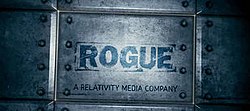Top Qs
Timeline
Chat
Perspective
Rogue Pictures
American film production company From Wikipedia, the free encyclopedia
Remove ads
Rogue (originally Rogue Pictures) was American film distributor founded in 1998 by Matt Wall and Patrick Gunn. It originally started off as a genre film label of the Universal Pictures-affiliated independent film studio October Films and was based in Universal City, California.
It was owned by October Films from 1998 to 1999, after which October was sold to USA Networks and merged with Interscope Communications and Gramercy Pictures to form USA Films. In 2004, Rogue was revived by Focus Features, which retained the studio until 2009, when it was acquired by Relativity Media, which declared its second and final bankruptcy in 2018.
Remove ads
History
Summarize
Perspective
Original October Films era (1998–1999)
On April 2, 1998, Rogue Pictures was formed as a division of the Universal Pictures' independent film label October Films, led by Patrick Gunn and Matt Wall, in order to release genre films to compete with Miramax's Dimension Films label. Rogue's theatrical releases, much in the same manner like Dimension did, would be handled by its parent company October Films, with video and television sales handled by October Films' parent company Universal, and all foreign sales would be handled by fellow Universal subsidiary Good Machine.[1]
One of the first film projects/script acquisitions greenlit by Rogue was the film Cherry Falls, while the first acquisition via the Rogue label was the film Orgazmo, although PolyGram Video handled the video rights of the film.[2][3] The Rogue name was dropped in 1999 after October Films was absorbed into USA Films following the merger with Interscope Communications and Gramercy Pictures.[4]
Focus Features era (2004–2009)
In 2004, the name and branding was revived as part of the Universal-owned Focus Features, with a goal of "high-quality suspense, action, thriller and urban features with mainstream appeal and franchise potential".[5] The revived Rogue Pictures would be led by the same team who led the Focus Features group, rather than having its own dedicated staff.[6]
In 2005, Universal expanded the company's operations to become a stand-alone division with a new goal of releasing ten films annually.[7] Later that year, Universal and Rogue signed a deal with newly formed Intrepid Pictures to produce, co-finance, and distribute films for five years.[8] In 2007, distribution and marketing of Rogue Pictures films were moved to Universal in company-wide shifts to accommodate Focus Features, putting Rogue Pictures under greater control of the parent company.[9]
Relativity Media era (2008–2018)

In 2008, Relativity Media approached Universal about buying the company, a move described in the entertainment media as "bold."[10] The following year, Relativity completed acquisition of the company.[11] This deal was part of Relativity Media reupping its agreement with Universal Pictures that would extend until 2015, and Universal would retain a distribution stake in future Rogue films.[12] On May 7, 2009, Relativity decided to turn the Rogue branding into a consumer brand that was used by the studio.[13]
In June 2012, Rogue and Relativity Media sold 30 of their films to Manchester Library Company,[14] which was acquired by Vine Alternative Investments in April 2017.[15]
Remove ads
Films
Remove ads
References
Wikiwand - on
Seamless Wikipedia browsing. On steroids.
Remove ads

